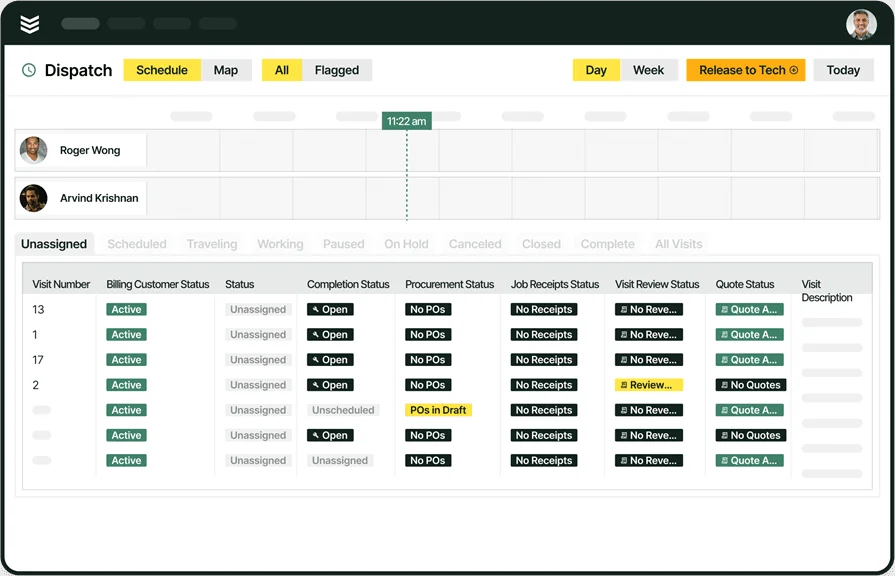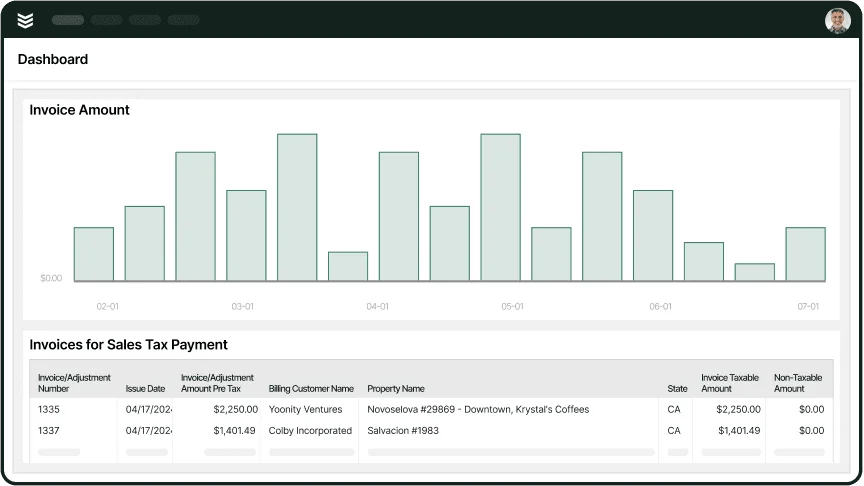Our research into thousands of contractor invoices showed one clear thing: the longer you take to get your invoices out, the longer it takes for you to get paid. And the longer you delay, the bigger that gap gets to actually getting paid. To get invoices out quickly in field service takes a unified system where scheduling and invoicing work together seamlessly, so you can get work done quickly, and invoices out even faster.
Scheduling and invoicing software helps streamline these processes by keeping job assignments organized and payments on track. It eliminates manual errors, reduces admin work, and makes it easier to manage everything in one place. Whether you’re handling service calls, project-based work, or maintenance contracts, the right software helps businesses stay efficient and profitable.
In this guide, we’ll break down the essential components of scheduling and invoicing software, including:
- Choosing the best scheduling and invoicing software for your business
- 6 key features to look for in invoicing and scheduling software
- 7 best scheduling and invoicing software for all contractor types
- 7 benefits of using scheduling invoicing software for operations
- 4 important scheduling and invoicing software FAQs answered
Let’s start with the most important step: figuring out how to choose the right scheduling and invoicing software that fits your business and keeps operations running efficiently.
Choosing the best scheduling and invoicing software for your business
A reliable scheduling and invoicing software keeps operations organized, reduces admin work, and helps contractors avoid costly mistakes. But not every system fits every business. Before committing to a platform, ask the important questions—because overlooking key features now could lead to bigger problems later.
- Daily workflows and scheduling needs – Can the software handle last-minute schedule changes, recurring jobs, and technician availability without creating confusion? Does it offer a simple way to assign work without overloading your team?
- Real-time updates and communication – Does it allow your team to receive live updates on schedule adjustments and invoice status? Can customers get automated appointment reminders and payment notifications without someone manually sending them?
- Integration with accounting and CRM tools – Will it connect with existing accounting software, CRM systems, and payment processors? Can you track job progress, invoices, and customer balances all in one place?
- Scalability as the business expands – Can the software grow with the company, whether that means adding more users, managing multiple locations, or handling a higher volume of invoices? Is pricing structured in a way that doesn’t force you to pay for unused features?
- Features that improve efficiency – Does it include automated invoicing, job scheduling, and customizable invoice templates? Can it generate reports that help track payments, outstanding balances, and job profitability?
Understanding what a business needs is the first step—choosing a system that solves daily challenges is just as important. Now, let’s take a look at six key features every scheduling and invoicing software should include to keep operations running smoothly.
6 key features to look for in invoicing and scheduling software
A busy day in the field is unpredictable. Jobs shift, emergency calls come in, and the last thing any technician needs is a scheduling mix-up or a missing invoice. Without a solid system, teams scramble to find job details, customers get frustrated waiting, and payments take too long to process. That’s why contractors rely on scheduling invoicing software to stay organized, send out accurate invoices, and keep cash flow steady. To keep operations running efficiently, these six features should be at the core of any scheduling and invoicing software.
1. Payment processing and online billing
Fast payments keep cash flow steady. An invoicing software with built-in payments allows customers to pay invoices instantly—whether online, through mobile payments, or directly on-site. This removes the hassle of tracking down late payments. For example, a plumbing technician completes a water heater installation for a homeowner. Instead of leaving an invoice behind and waiting for a check, they pull up the invoice on their phone, accept a credit card payment, and email a receipt—before even leaving the driveway.
2. Automated job scheduling and dispatching
A smooth-running schedule keeps jobs on track and prevents costly delays. Comprehensive dispatching features prevent double bookings, optimizes job assignments, and ensures technicians are dispatched efficiently. Let’s say an HVAC company gets an emergency service request for a failed rooftop unit. Instead of manually shuffling the schedule, the system finds the nearest available technician, updates their route, and notifies the customer—all within seconds. No missed appointments, no wasted drive time.
3. Integrated quoting and invoicing system
Turning a service estimate into an invoice shouldn’t take extra work. Scheduling invoicing software with integrated quotes ensures that approved quotes seamlessly convert into invoices—without needing to re-enter details. Imagine an electrical contractor performing a panel upgrade. The customer requests additional outlets mid-job. Instead of waiting for office approval, the technician updates the quote on-site, gets customer sign-off, and generates the final invoice immediately—no back-and-forth required.

Invoicing Toolkit for Contractor
Cash flow takes a hit when payments get delayed—learn how to stay on track.
4. Recurring service agreements and contract management
For businesses handling maintenance contracts, built-in automated service agreements keeps recurring jobs organized. It ensures that scheduled services are never missed and that customers receive invoices at the correct intervals. Take a refrigeration contractor managing dozens of restaurant service contracts. Instead of manually tracking each visit, the system auto-generates recurring appointments, assigns the right technician, and invoices the customer as soon as the job is marked complete. No missed services, no billing delays.
5. Time tracking and payroll integration
Accurate time tracking prevents payroll disputes and ensures technicians are paid for their actual hours. Built-in time tracking features eliminate manual entry errors and keeps payroll running smoothly. For instance, a field service company with multiple crews working on long-term projects uses GPS-enabled time tracking. Instead of relying on paper timesheets, technicians clock in and out through the app, ensuring billable hours are accurately recorded and paid.
6. Customer management and job history tracking
A complete record of past jobs, invoices, and customer details improves service quality and prevents billing disputes. CRM functionality built into your scheduling and invoicing software helps keep everything in one place, allowing contractors to track job history, outstanding balances, and follow-up appointments. Consider an HVAC technician returning to a commercial property for a follow-up repair. Instead of sorting through old paperwork, they pull up the customer’s job history, see past invoices, and access notes from previous visits—allowing them to complete the work faster and with full context.
Other features dispatchers want in invoicing and scheduling software
While the core features of invoicing and scheduling software handle job assignments and payments, additional tools can improve efficiency for dispatchers and field teams. These extra features help businesses streamline operations and reduce manual work.
- Fleet tracking and route optimization – Knowing where every vehicle is in real time allows dispatchers to assign jobs efficiently and reduce fuel costs.
- Sales pipeline tracking – Managing new job requests and tracking leads ensures that potential work isn’t lost in the shuffle.
- Advanced reporting and analytics – Customizable reports provide insights into job performance, revenue trends, and outstanding invoices, helping businesses make data-driven decisions.
These features add another layer of efficiency, giving dispatchers better visibility into daily operations while keeping the business running smoothly.
7 best scheduling and invoicing software for all contractor types
Finding scheduling invoicing software that fits your business depends on the size of your team, the type of jobs you handle, and how you manage payments. Some platforms focus on large-scale operations, while others are built for smaller service teams that need simple scheduling and quick invoicing. This list covers seven top solutions designed for different contractor types, helping businesses stay organized, reduce admin work, and speed up payments.
1. Best for commercial contractors: BuildOps
BuildOps is designed specifically for commercial contractors, offering a complete solution for job scheduling and invoicing at scale. It provides real-time scheduling tools that prevent job conflicts, automated invoicing that eliminates manual data entry, and a mobile-friendly platform that keeps technicians connected to office teams. Its advanced system ensures that recurring jobs, emergency service calls, and large-scale projects stay organized without overwhelming dispatchers or technicians.
How Pricing Works: BuildOps offers tailored pricing based on the size and needs of your team. Contractors can schedule a personalized demo to explore the platform’s features and see how it fits their workflow.
Features Beyond Scheduling and Invoicing: BuildOps goes beyond basic scheduling and invoicing by integrating payment processing, and advanced reporting into a single platform. Technicians can generate invoices directly from completed work orders, ensuring no job is left unbilled. The system also supports automated recurring billing for maintenance contracts, reducing admin time for back-office staff. Real-time job tracking allows dispatchers to monitor technician locations and adjust schedules as needed, improving response times for urgent calls.
What Sets It Apart for Commercial Contractors: BuildOps stands out with its ability to manage multi-location clients, complex scheduling needs, and large-scale service teams. Its seamless integration between scheduling and invoicing software ensures that no job goes unbilled, and payments are processed without delays.

Demo scheduling + invoicing
Check out BuildOps scheduling and invoicing tools—built for commercial contractors.
2. Best for residential contractors: Housecall Pro
Image Source: Housecall Pro
Housecall Pro is a popular choice for residential contractors, offering easy-to-use scheduling invoicing software with built-in customer communication tools. The platform is designed for small to medium-sized service businesses, providing automated job scheduling, real-time technician tracking, and integrated payment processing. While Housecall Pro is feature-rich for residential operations, it may lack the advanced reporting tools commercial contractors need.
How Pricing Works: Housecall Pro offers monthly plans with pricing based on the number of users and features required.
Features Beyond Scheduling and Invoicing: In addition to job scheduling, Housecall Pro provides automated customer reminders, mobile-friendly invoicing, and integrated credit card processing. Technicians can collect payments in the field, reducing delays and eliminating the need for follow-ups on unpaid invoices. The software also allows customers to book appointments online, helping residential service businesses fill their schedules faster without back-and-forth phone calls.
What Sets It Apart for Residential Contractors: Housecall Pro’s built-in communication features, including automated appointment reminders and real-time status updates, make it ideal for customer-focused residential contractors. Clients can book online, receive notifications about their technician’s arrival, and pay invoices directly through the platform.
See how BuildOps and Housecall Pro stack up against each other if you want to dive in deeper.
3. Best for general contractors: Jobber
Image Source: Jobber
Jobber provides a comprehensive scheduling and invoicing software solution for general contractors handling various project types. It includes job scheduling, client management, and automated invoicing—all in a simple, user-friendly interface. While Jobber excels in ease of use and mobile accessibility, larger contractors may find its reporting features limited compared to more enterprise-level tools.
How Pricing Works: Jobber offers pricing plans starting at $129 per month for teams up to 5, with additional tiers for more users and features.
Features Beyond Scheduling: Jobber enhances scheduling with features like automatic job follow-ups, recurring work orders, and team time tracking. The software provides job status updates in real time, helping contractors manage multiple projects simultaneously without losing track of completed work. Its invoicing system allows users to set up batch billing, generate quotes that convert into invoices, and send payment reminders to reduce overdue balances.
What Sets It Apart for General Contractors: Jobber’s flexible scheduling and customizable workflows make it a great fit for general contractors handling a mix of service calls and project-based work. The platform’s automated follow-ups ensure invoices don’t go unpaid, while its mobile-friendly design keeps field teams updated on job assignments.
4. Best for fleet-based contractors: WorkWave
Image Source: WorkWave
WorkWave provides a cloud-based scheduling and invoicing software solution tailored for service businesses that rely on efficient scheduling and route management. The platform helps automate scheduling, invoicing, and dispatching while keeping operations streamlined. However, WorkWave may not be the best choice for contractors looking for in-depth job costing or advanced financial reporting features.
How Pricing Works: WorkWave offers custom pricing based on business size and needs, with scalable options for growing companies.
Features Beyond Scheduling: Route optimization, automated invoicing, and mobile workforce tracking
What Sets It Apart For Fleet-based Contractors: WorkWave is ideal for businesses that need advanced route optimization and fleet tracking. Its GPS-powered dispatching system reduces travel time, increases job efficiency, and ensures technicians reach their job sites as quickly as possible.
5. Best for service contractors: FieldEdge
Image Source: FieldEdge
FieldEdge is a cloud-based scheduling and invoicing software designed for field service businesses. It offers real-time job tracking, integrated invoicing, and mobile accessibility to help service teams stay connected and efficient. That said, businesses that require robust project management tools or advanced automation features may find FieldEdge somewhat limited.
How Pricing Works: FieldEdge offers subscription-based pricing tailored to the needs of small to mid-sized service businesses.
Features Beyond Scheduling: Customer management, service agreement tracking, and real-time financial reporting
What Sets It Apart For Service Contractors: FieldEdge specializes in helping service businesses maintain long-term customer relationships by tracking job history, service agreements, and past invoices in one place—making follow-up work seamless and reducing miscommunication with clients.
6. Best for small field service businesses: mHelpDesk
Image Source: mHelpDesk
mHelpDesk offers an all-in-one scheduling and invoicing software designed for small to mid-sized field service businesses. It combines job scheduling, automated billing, and real-time customer management into a single platform. However, some users have reported that mHelpDesk’s customer support and mobile app functionality can be inconsistent, which may be a drawback for teams relying on real-time updates.
How Pricing Works: mHelpDesk provides tiered pricing based on the number of users and features required, with options for small businesses and larger teams.
Features Beyond Scheduling: Custom job workflows, recurring billing, and lead management
What Sets It Apart For Small Field Service Businesses: mHelpDesk stands out with its fully customizable workflows, allowing businesses to tailor job scheduling and invoicing processes to match their unique needs. It’s a great fit for businesses that require flexibility in managing service requests and payments.
7. Best for customer-focused service businesses: Kickserv
Image Source: Kickserv
Kickserv is a user-friendly scheduling and invoicing software platform built for service-based businesses. It simplifies job scheduling, invoice management, and customer communication, helping contractors stay on top of their daily operations. That said, Kickserv may not be the best choice for businesses that require complex job tracking or multi-location scheduling capabilities.
How Pricing Works: Kickserv offers flexible monthly pricing with free options for small teams and premium plans for businesses with growing service needs.
Features Beyond Scheduling: CRM functionality, automated invoicing, and customer self-service portals
What Sets It Apart For Customer-focused Service Businesses: Kickserv’s customer self-service portal allows clients to schedule appointments, review invoices, and make payments online—reducing administrative workload while improving customer satisfaction.
7 benefits of using scheduling invoicing software for operations
Running a field service business means juggling schedules, managing invoices, and keeping technicians on the move. Without an efficient system, scheduling conflicts, missed payments, and administrative slowdowns can quickly pile up. Scheduling and invoicing software simplifies these processes, reducing errors and keeping operations running smoothly. Here are seven key benefits that businesses gain when they switch to a digital scheduling and invoicing system.
1. Fewer scheduling conflicts and double bookings
Without a clear system, double-booked appointments and last-minute rescheduling can cause delays, frustrate customers, and waste valuable technician hours. Scheduling and invoicing software provides automated job tracking and technician availability updates, reducing scheduling errors and ensuring work is assigned efficiently. Consider a plumbing company that regularly handles emergency calls. Without an automated system, dispatchers manually track technician availability, often leading to overlapping jobs. With scheduling software, open time slots are updated in real time, preventing costly double bookings.
Deep Dive
Learn more about how to eliminate scheduling conflicts to increase productivity in our comprehensive guide to field service scheduling, where we break down 10 actionable best practices you can implement into your scheduling operations starting today.
2. Faster invoice processing and fewer payment delays
Manual invoicing slows down payments, especially when paperwork gets lost or customers forget to pay on time. A scheduling and invoicing software solution automates invoice generation, sends reminders for unpaid bills, and offers online payment options—reducing delays and improving cash flow. Imagine an HVAC technician who completes a furnace repair and immediately generates an invoice on their mobile device. The customer pays on the spot through an integrated payment system, eliminating the need for follow-ups and reducing outstanding balances.
3. Reduced administrative workload
Field service businesses deal with a high volume of scheduling and invoicing tasks, and manual processes create unnecessary admin work. Scheduling and invoicing software automates recurring tasks like appointment confirmations, invoice generation, and follow-up reminders, allowing office staff to focus on more critical business operations. For example, a general contracting company that manages multiple job sites no longer needs to manually create invoices at the end of each project. Instead, completed work orders automatically generate invoices, saving hours of admin time each week.
4. Improved technician productivity and job tracking
Keeping technicians on schedule and ensuring they have the right job details is key to maximizing efficiency. Scheduling and invoicing software allows field teams to access job assignments, customer history, and invoicing details from a mobile app, reducing time wasted on back-and-forth communication. Picture an electrician who arrives at a job site and discovers missing details about the service call. Instead of calling the office for clarification, they pull up the work order, previous job notes, and the customer’s invoice history on their phone—keeping the job moving without delays.
Did you know
One of the best ways to achieve this kind of increased efficiency (like the 50% increase our customers have seen) is through the use of a mobile field technician app that can complete all the same functions and access the same information that office staff can. Techs can send real-time updates back to HQ, so the admin team can get working on invoicing for work completed.
5. Enhanced customer experience and trust
Customers appreciate clear communication and fast service. Scheduling and invoicing software provides automated appointment reminders, real-time technician tracking, and instant invoicing, improving the overall service experience and building long-term customer trust. For instance, a pest control company sends an automated text reminder the day before an appointment, along with a live technician tracking link. The customer knows exactly when to expect service, reducing missed appointments and last-minute cancellations.
6. Better financial insights and reporting
Understanding business performance requires accurate financial data. Scheduling and invoicing software offers reporting tools that track revenue, outstanding invoices, and technician efficiency, helping businesses make smarter financial decisions. For example, a commercial refrigeration service company can track which service contracts generate the most revenue and which customers frequently delay payments. With this insight, they can prioritize high-value clients and implement stricter payment policies.
To learn more about how an integrated scheduling and invoicing tool improves financial management, check out our full guide to field service invoicing.
7. Seamless integration with other business tools
A strong scheduling and invoicing software system connects with accounting software, CRM platforms, and job management tools, creating a seamless workflow across all aspects of the business. This eliminates the need for manual data entry and reduces errors. Think about a landscaping business that integrates its scheduling and invoicing system with QuickBooks. Completed jobs instantly sync with financial records, preventing duplicate data entry and ensuring tax records stay accurate.
With scheduling and invoicing software, businesses can reduce manual work, speed up payments, and improve overall efficiency. Whether it’s preventing scheduling conflicts, automating invoices, or tracking financial performance, the benefits go beyond just keeping jobs organized—they directly impact profitability and customer satisfaction.
4 important scheduling and invoicing software FAQs answered
Even with the best scheduling and invoicing software, contractors and field service businesses often have questions about how these tools fit into their operations. From integrations to pricing, here are answers to some of the most common questions businesses ask before making the switch.
1. How does scheduling and invoicing software help with job management?
Scheduling and invoicing software centralizes job assignments, technician availability, and invoicing. It automates scheduling, prevents double bookings, and ensures jobs are invoiced immediately—reducing common issues. For businesses, paper schedules or manual invoicing will be a thing of the past.
2. Can scheduling and invoicing software integrate with other business tools?
Yes, most modern scheduling and invoicing platforms integrate with accounting software like QuickBooks, CRM systems, payment processors, and even fleet tracking tools. These integrations help streamline operations by syncing financial data, automating follow-ups, and improving job tracking. Before choosing a platform, check its compatibility with the tools your business already uses.
3. Is scheduling and invoicing software suitable for small businesses?
Absolutely. Many scheduling and invoicing solutions offer scalable pricing plans that work for small businesses as well as larger operations. Small service teams benefit from automated scheduling, faster invoicing, and real-time job tracking—features that help them run a more organized and profitable business without needing a large administrative staff.
4. How much does scheduling and invoicing software cost?
Pricing varies based on the platform, the number of users, and the level of features included. Some solutions charge a monthly subscription fee, while others offer tiered pricing based on business size. Many providers also offer free trials, allowing businesses to test the software before committing.
By implementing scheduling and invoicing software, contractors can eliminate scheduling conflicts, speed up payments, and reduce administrative headaches. Whether you're a small team or a large-scale operation, finding the right solution ensures smoother day-to-day operations and better cash flow.
Managing job schedules and invoices manually can slow down operations, increase errors, and create unnecessary stress for both office staff and technicians. With the right scheduling and invoicing software, businesses can eliminate double bookings, automate invoicing, and ensure payments are collected on time—without adding extra administrative work.
For contractors, choosing a solution that fits their workflow is key. Whether it's a simple tool for small service teams or an all-in-one platform for large commercial operations, the right software makes scheduling seamless and invoicing effortless. Platforms like BuildOps provide a complete solution for commercial field service businesses, integrating scheduling, invoicing, and real-time job tracking into one system.

Demo end-to-end field service management
Our customers see a 50% reduction in time to schedule, and slashed billing times of 73%.






